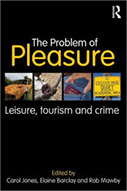THE PROBLEM OF PLEASURE: LEISURE, TOURISM, AND CRIME

Editors: Carol Jones, Elaine Barclay and Rob Mawby
Publisher: London; New York: Routledge, 2012. 247p.
Reviewer: Kim H. Williams | January 2017
We often hear of the social and economic benefits of tourism on global and domestic economies. Yet, the negative effects are often overlooked, as tourism serves as a panacea for cash strapped governments. The Problem of Pleasure: Leisure, Tourism, and Crime highlights the proverbial “elephant in the room,” and can open dialogue on ways to minimize the problems associated with leisure and tourism.
The Problem of Pleasure is a compilation of research regarding the often questionable motivations and unfortunate circumstances that impact leisure and tourism across the world. This text explores the implications and consequences associated with the pursuit of leisure as well as the ongoing efforts to minimize the deleterious effects of these pursuits. Although the book provides detailed research and intriguing material, the arguments contained within, both implicit and explicit, are occasionally dubious, and the text itself often lacks a logical flow between articles.
First, I would like to acknowledge the strengths of The Problem of Pleasure. The individual chapters are very well-written, providing ample data and evidence in order to support claims. A particularly notable example is Richard George’s “Visitor perceptions of crime-safety and attitudes towards risk.” This piece provides meticulously collected data regarding the types of crimes experienced by victimized tourists at Cape Town’s Table Mountain National Park, and how such incidents impacted the local tourism industry. Another chapter that focuses on young females’ attraction to the horror movie genre provides thought-provoking and insightful arguments that are highly relevant in modern society. Each of the individual works contains its own unique writing style and sense of appeal.
My criticism concerns how these specialized topics are presented, particularly in Part 1. There are definitely hints of bias, exemplified by a particular piece that explores the realm of illicit drugs. The authors make their opinions clear, criticizing government entities for making illegal certain drugs, rather than making the use of such drugs as safe as possible. This is a valid opinion, but it feels out of place in a research-based, academic writing of this nature. Yet another chapter reveals a similar bias by essentially justifying young adults’ efforts to develop and express their identities even when coming into conflict with the law and established social norms. Yet again, the author here is certainly entitled to his opinion on the topic at hand. However, it does not seem like the proper forum for such work.
I found a lack of unity among the various selections, especially those in Part 1. They are vaguely bound by the overall theme of leisure, but are wildly different from one another, making the transition between articles rather jarring at times. Part 2 is a vast improvement, revolving around the more unified topic of tourism. Much of the research in Part 2 was interconnected, with each work building on the others. While there were some overarching themes and topics in Part 1, the pieces are, for the most part, only slightly related to one another.
Overall, The Problem of Pleasure is an effective classroom text particularly for a special topics course. It contains a wide scope of information, much of which, however, is not particularly suited for hospitality and tourism core courses. The second part of the text contains a greater focus on tourism. The tourism research is, however, highly specialized, mainly focusing on select locations and pursuits within the tourism industry, such as the Australian caravans. I commend the authors in their pursuit of informing and enlightening a diverse group of readers about the global challenges plaguing the tourism and leisure industry.
Dr. Kim H. Williams is an Associate Professor and the Director of the Lester E. Kabacoff School of Hotel, Restaurant and Tourism at the University of New Orleans


